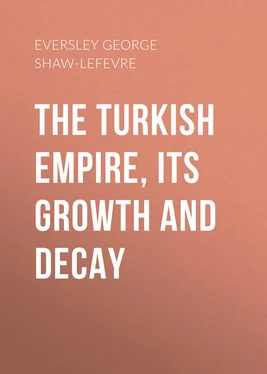George Eversley - The Turkish Empire, its Growth and Decay
Здесь есть возможность читать онлайн «George Eversley - The Turkish Empire, its Growth and Decay» — ознакомительный отрывок электронной книги совершенно бесплатно, а после прочтения отрывка купить полную версию. В некоторых случаях можно слушать аудио, скачать через торрент в формате fb2 и присутствует краткое содержание. Жанр: foreign_antique, foreign_prose, на английском языке. Описание произведения, (предисловие) а так же отзывы посетителей доступны на портале библиотеки ЛибКат.
- Название:The Turkish Empire, its Growth and Decay
- Автор:
- Жанр:
- Год:неизвестен
- ISBN:нет данных
- Рейтинг книги:3 / 5. Голосов: 1
-
Избранное:Добавить в избранное
- Отзывы:
-
Ваша оценка:
- 60
- 1
- 2
- 3
- 4
- 5
The Turkish Empire, its Growth and Decay: краткое содержание, описание и аннотация
Предлагаем к чтению аннотацию, описание, краткое содержание или предисловие (зависит от того, что написал сам автор книги «The Turkish Empire, its Growth and Decay»). Если вы не нашли необходимую информацию о книге — напишите в комментариях, мы постараемся отыскать её.
The Turkish Empire, its Growth and Decay — читать онлайн ознакомительный отрывок
Ниже представлен текст книги, разбитый по страницам. Система сохранения места последней прочитанной страницы, позволяет с удобством читать онлайн бесплатно книгу «The Turkish Empire, its Growth and Decay», без необходимости каждый раз заново искать на чём Вы остановились. Поставьте закладку, и сможете в любой момент перейти на страницу, на которой закончили чтение.
Интервал:
Закладка:
The Republics of Venice and Genoa gave their support, and as, at this time, the Ottomans had no naval force, it was hoped that these Powers, by means of their numerous and powerful galleys, would prevent the transfer to Europe of Murad’s main army, which was again engaged in conflict with the Karamanians in Asia Minor.
The allied army, under these favourable circumstances, crossed the Danube in 1443. It defeated an Ottoman army on the banks of the Masova and again at Nisch. It then crossed the Balkan range in winter – an operation of extreme difficulty, which has since only twice been effected, by General Diebitsch and General Gourko – and again defeated the Turks in a battle at the foot of these mountains. Strange to say, instead of marching onwards to Adrianople, as Diebitsch did in 1829, Hunyadi was content with the laurels already achieved, and returned with his army to Buda, where he displayed his trophies and received a triumph.
Murad, on hearing of the retreat of the Hungarians across the Balkans, determined to come to terms with them, and not to pursue them again across the Danube. With some difficulty, and in spite of the sullen opposition of Cardinal Julian and the French contingent, a treaty was agreed to, at Szegeddin, with Ladislaus, by which Serbia was to be freed from dependence on the Ottoman Empire and Wallachia was to be ceded to Hungary. The treaty was to be in force for ten years. It was solemnly sworn to on the Gospel and the Koran by Ladislaus and Murad.
While this treaty was being negotiated Murad, weary of war, and desirous of spending the remainder of his life in sensual enjoyments which had so long been denied to him, decided to abdicate his throne. He was still in the full vigour of life at the age of forty-one, though he was said to be growing rather fat. He did not propose, like the Emperor Charles V, to retire to a monastery, but rather, like Diocletian the Roman Emperor, to a luxurious palace, surrounded by beautiful gardens, which he had prepared for his retreat at Magnesia. On the ratification of the treaty of Szegeddin, in 1444, he carried out this purpose, and his son Mahomet, at the age of fourteen, was proclaimed Sultan in his place.
When this became known to the Hungarians a revulsion of opinion took place against the recent treaty with the Turks. The Hungarian Diet determined, at the instance of Cardinal Julian, backed up by the Pope, to break the treaty. News had arrived of a fresh outbreak of the Karamanians. The fleets of Genoa, Venice, and Burgundy were masters of the Hellespont and would, it was believed, prevent the Ottoman army in Asia Minor from crossing into Europe. The opportunity for crushing the Turks and driving them out of Europe seemed to be most favourable.
Is it now [said Cardinal Julian to the Hungarian Diet] that you will desert expectations and your own fortunes? Is it to your God and your fellow-Christians that you have pledged your faith? That prior obligation annihilates a rash and sacrilegious oath to the enemies of Christ. His vicar on earth is the Roman Pontiff, without whose sanction you can neither promise nor perform. In his name I absolve your perjury and sanctify your arms. Follow my footsteps in the path of glory and salvation; and, if you still have scruples, devolve on my head the punishment and the sin.
“This mischievous casuistry,” says the historian Gibbon, “was seconded by his respectable character and the levity of popular assemblies.” The Hungarian Diet resolved on war, and King Ladislaus, in spite of his recent oath, determined to break the treaty. Hunyadi was, in the first instance, strongly opposed to this, but his assent was obtained by the promise of the throne of Bulgaria, in the event of the defeat of the Ottomans and the conquest of that province. The Prince of Serbia, who had regained his independence by the treaty, was persuaded to join with the allies by the promise of an addition to his kingdom.
It was decided to send an army at once against the Ottomans. But it was a much reduced one in comparison with that which had so recently crossed the Balkans. Most of the French and German knights and their attendants had already gone home. Not more than ten thousand remained under Hunyadi. They were joined by five thousand Wallachians. They invaded Bulgaria, and then, instead of crossing the Balkans, descended the Danube to the coast and thence marched to Varna. Meanwhile the Ottomans, in great alarm and fearing the incompetence of the young Mahomet to conduct a great war, induced Murad to emerge again from his retreat. He hastily gathered together an army in Asia Minor. He bribed the Genoese, at the rate of a ducat for each man, to convey it across the Hellespont. He arrived in front of Varna unexpectedly, before the Christian army knew of his intentions. His army greatly outnumbered that of King Ladislaus. In spite of this, the two wings of it were driven back with great slaughter. Murad, in command of the centre of his army, for the moment and for the only time in his life, lost his presence of mind and was disposed to fly. But the Beglerbey of Anatolia laid hold of the bridle of his horse and urged him to fight it out. The battle was renewed. The Janissaries stood firm and successfully repulsed the main body of the Christians. Ladislaus was unhorsed and asked for quarter. But he was put to death on the field. His head was stuck upon a lance and was held up by the side of another lance which bore on high a copy of the violated treaty. The Christians, when they saw the head of their dead king in its soldier’s helmet thus held aloft, were struck with panic and fled precipitately. Hunyadi escaped with difficulty. Cardinal Julian expiated by death on the field his sin in advising the breach of the treaty. Two other bishops shared his fate. Never was defeat and disaster more richly deserved. Two-thirds of the Christian army were slain in the battle, and even greater numbers, though a less proportion, of the Ottomans shared their fate.
Murad, having won this great victory, again, a second time, abdicated his throne and returned to his retreat at Magnesia, and again the young Mahomet was invested as Sultan. Though history supplies cases of great kings seeking retirement from the cares of office, and of some of them being induced to resume their thrones, it records no other case of a second abdication and a second resumption. Murad was very soon recalled from his abode of pleasure. A serious outbreak of the Janissaries occurred at Adrianople. They ravaged the city and committed great atrocities. The ministers of the young Sultan were greatly alarmed. They felt that only a strong hand could keep a check on the unruly Janissaries. Murad was again summoned from his retreat. The young Mahomet was induced to go on a hunting expedition. In his absence Murad again made his appearance at Adrianople and resumed power. Mahomet, on his return from hunting, found that his father was again in the saddle. Murad was received by his troops with a great ovation, and even the unruly Janissaries gave in their submission to him. He did not again seek retirement at Magnesia. He reigned for seven more years – another period of almost incessant war. He first made an invasion of the Morea, which the Greek Emperor’s brothers had divided between them and governed as petty princes, or despots, as they were called. Murad had no difficulty in storming and capturing the fortification by which the isthmus of Corinth was defended. He compelled the two despots to accept the position of vassals under the Empire.
Murad then again turned his attention to Serbia and Hungary. He defeated the combined forces of Hungary, Serbia, and Bosnia, under Hunyadi, on the field of Kossova, where in 1389 Murad I had first subdued the Serbians. As a result of this great battle Serbia lost its independence and was finally incorporated as an integral part of the Ottoman Empire. Bosnia became a tributary State.
Читать дальшеИнтервал:
Закладка:
Похожие книги на «The Turkish Empire, its Growth and Decay»
Представляем Вашему вниманию похожие книги на «The Turkish Empire, its Growth and Decay» списком для выбора. Мы отобрали схожую по названию и смыслу литературу в надежде предоставить читателям больше вариантов отыскать новые, интересные, ещё непрочитанные произведения.
Обсуждение, отзывы о книге «The Turkish Empire, its Growth and Decay» и просто собственные мнения читателей. Оставьте ваши комментарии, напишите, что Вы думаете о произведении, его смысле или главных героях. Укажите что конкретно понравилось, а что нет, и почему Вы так считаете.












